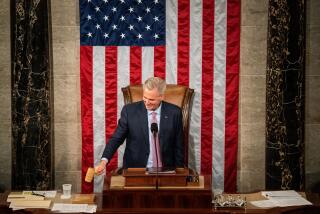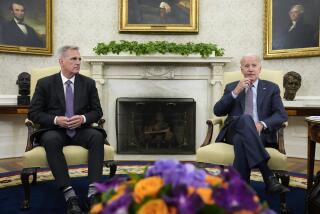House Gets Hike in Outside Pay : Quick Rules Change to Allow $7,500 More
- Share via
WASHINGTON — Although dragging their feet for weeks over consideration of the $1-trillion 1987 federal budget, House members Tuesday took only minutes to ram through a controversial rules change that allows them to pocket an additional $7,500--and maybe more--in outside earnings every year.
The change, approved without committee scrutiny, floor debate or a recorded vote, raises the annual ceiling on honoraria that House members are allowed to keep for speaking engagements from 30% to 40% of their annual $75,100 salaries. The limit for rank-and-file members would leap to $30,040, while House Speaker Thomas P. (Tip) O’Neill Jr. (D-Mass.), Majority Leader Jim Wright (D-Tex.) and Minority Leader Robert H. Michel (R-Ill.) would get to keep a little more because they get paid more than other members.
But the wording of the new rule was so vague that, according to the parliamentarian’s office, it might also have done away with all restrictions on other types of outside income that congressmen can make to supplement their federal pay, including professional fees or salaries from other jobs.
The revision does not affect the current limit of $2,000 that members are allowed to accept for any speaking engagement. In addition to their salaries, lawmakers get generous office allowances and free trips back to their home districts.
Proposed by Rep. John P. Murtha (D-Pa.), the generous new earning limits do not need to be approved by the Senate and go into effect immediately. Murtha raised the proposal shortly after the House convened Tuesday at a time when the chamber was nearly empty. It was approved under a procedure normally reserved for non-controversial legislation in which a measure is deemed passed unless someone rises to object to it.
Avoid Comment
Leaders of both parties as well as Murtha avoided comment after approval of the earnings limit increase, but the change clearly had their approval. O’Neill was presiding over the chamber when Murtha brought up the measure and Republican Whip Trent S. Lott (R-Miss.) was also on the floor at the time but raised no objection.
One member of the Democratic leadership team, who asked not to be identified, insisted that he knew nothing about the proposal until it reached the floor and suggested that a deal must have been worked out at the highest levels in both parties. “There apparently is a need-to-know system on this,” he suggested sheepishly.
Later, however, Rep. Robert S. Walker, a conservative Pennsylvania Republican, attacked both Republican and Democratic leaders for cutting a deal and making an “end run” around open consideration of such a politically embarrassing change.
‘Ought to Be Appalled’
“This is typical of the way the House behaves when it comes to upping its own perks,” Walker complained. “I think the American people ought to be appalled.”
Fred Wertheimer, the president of Common Cause, a public interest lobbying group, ridiculed House leaders for engineering a “rape of the process” that will allow lawmakers to take more money from special interests. The new rule amounted to “an open invitation for increased ethical abuses by members of the House,” Wertheimer charged. “It is a frontal assault on the integrity of Congress.”
The Senate, whose members also earn $75,100 a year, last December approved a similar increase in honoraria limits from 30% to 40% of members’ salaries. However, Senate rules prohibit members from taking pay for outside work.
Popular Speakers
While few lawmakers come close to reaching the legal limit on honoraria, the ceiling hike could be of most benefit to legislative leaders who are highly sought as speakers.
In 1984, the last year for which complete statistics are available, at least 22 House members and 16 senators topped legal limits on honoraria but gave the excess to charity, according to Common Cause. The list was crowded with leaders, including O’Neill, Michel and Wright.
In the House that year, Rep. Dan Rostenkowski (D-Ill.), the powerful chairman of the Ways and Means Committee, earned the most money, taking in $93,000 in honoraria and keeping $21,800 of that for himself. Senate Majority Leader Bob Dole (R-Kan.) led his chamber with $115,929 in honoraria, of which he kept $20,349.
More to Read
Get the L.A. Times Politics newsletter
Deeply reported insights into legislation, politics and policy from Sacramento, Washington and beyond. In your inbox twice per week.
You may occasionally receive promotional content from the Los Angeles Times.










